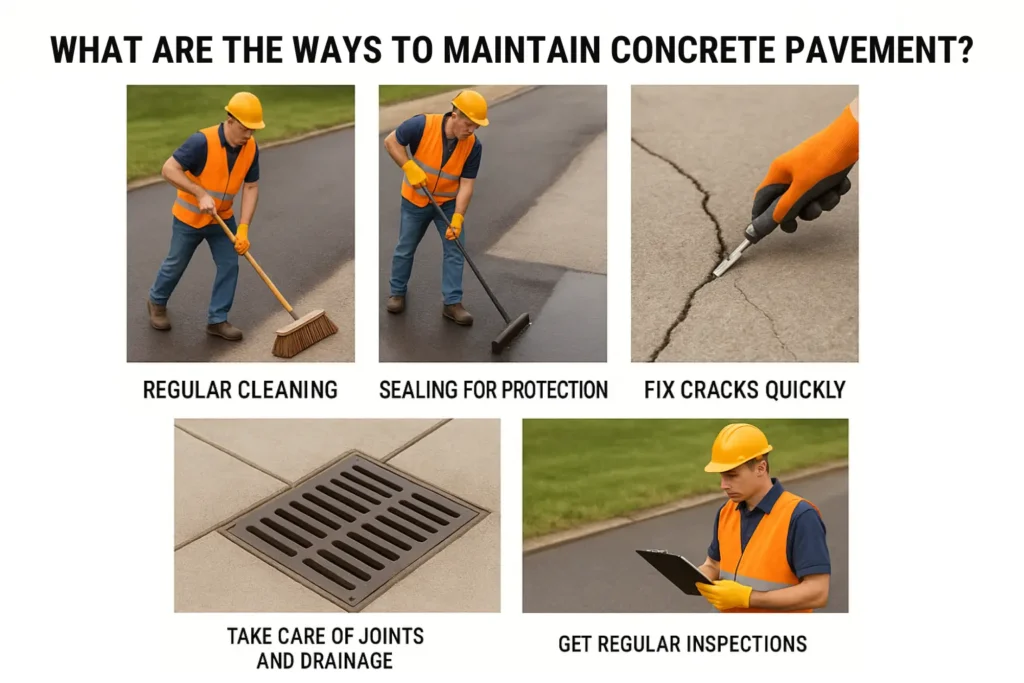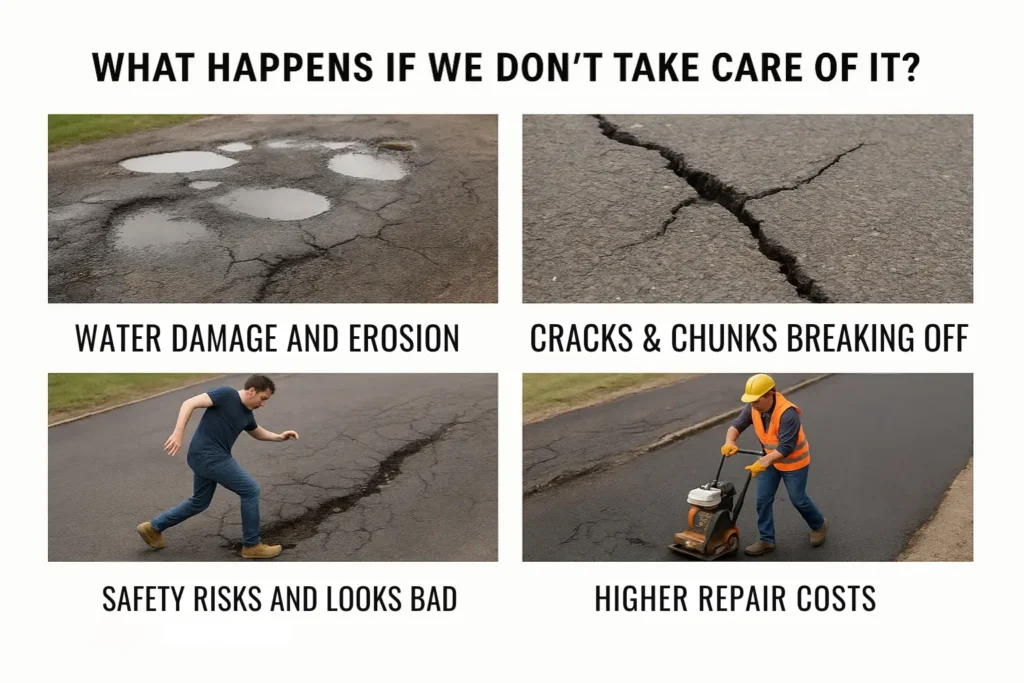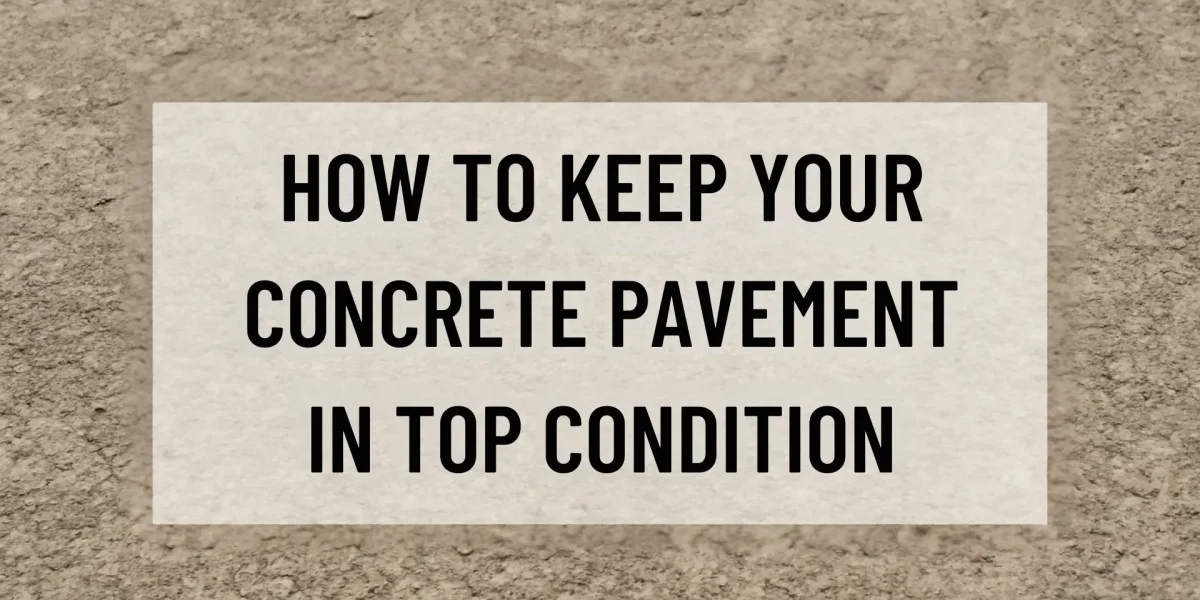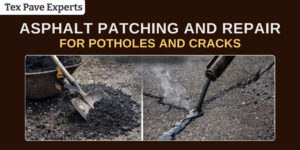Concrete pavement is a hard surface made with a special mix called portland-cement concrete (PCC). It is often used for roads, driveways, and patios. Unlike asphalt, which can bend a little under weight, concrete is very stiff. This stiffness helps it spread out the weight of cars and trucks so the ground below doesn’t get damaged. Because of this, concrete pavements can last for many years if they are taken care of properly.
A pavement system usually has three main parts:
- Surface course (PCC slab): This is the top layer that carries the traffic. It makes the road smooth, safe to drive on, and also keeps water from soaking into the lower layers.
- Base course: This layer of crushed stone or other material sits under the slab. It helps spread out the loads even more and lets water drain away.
- Subbase or subgrade: This is the natural ground or extra support layer under everything. It helps stop frost damage and keeps fine soil from mixing into the base.
If the concrete slab cracks, breaks, or lets water in, it can lose its strength and stop working well. That’s why regular care, like cleaning, sealing the joints, and fixing small problems early, is important to keep the pavement strong and lasting longer.
What are the Ways to Maintain Concrete Pavement?

Concrete may look super strong, but it can still crack or wear down if you don’t take care of it. Since concrete has tiny pores, water, dirt, and chemicals can get inside and cause damage over time. Regular maintenance keeps your pavement safe, looking nice, and lasting longer. Here are some simple tips:
- Regular Cleaning – Dirt, dust, and pollution build up on concrete and can slowly damage the surface. Cleaning with a broom, soft brush, or even a pressure washer helps keep it clear and prevents stains. Don’t use harsh chemicals or salt for melting ice, they can make concrete break down faster.
Why? Small particles and chemicals can seep inside the concrete. When water freezes and thaws, it expands, making cracks worse. Keeping it clean also makes it safer to walk on and look better. - Sealing for Protection – Since concrete is porous, water, oils, and chemicals can soak in and cause stains or cracking. Putting on a good sealer adds a protective layer that keeps liquids out. It also makes cleaning easier later.
Why? Sealing the surface and joints stops water and harmful materials from getting inside. This protects the base layers under the concrete and helps prevent serious problems like spalling (chunks breaking off). - Fix Cracks Quickly – It’s normal for concrete to crack as it ages. Some cracks grow, while others stay the same, but both let water in and cause more damage. Small cracks can be filled with repair products, while bigger ones might need a professional.
Why? If water gets into cracks, it can damage the ground or metal supports underneath, leading to even bigger cracks. Fixing them early stops this cycle. - Take Care of Joints and Drainage – Concrete has joints to control where cracks form and to handle temperature changes. If joints aren’t sealed, water and debris can get in and cause damage. Also, make sure water drains properly. Puddles can cause erosion, white stains, or freeze-thaw damage.
Why? Good drainage and sealed joints keep water away from the slab and base, reducing stress and preventing cracks. - Get Regular Inspections – Check your pavement now and then for cracks, surface problems, or drainage issues. Professionals can spot small issues before they turn into big, expensive repairs. Preventive maintenance works best when the pavement is still in good condition.
Why? Fixing little problems early saves money, keeps the pavement stronger for longer, and avoids major disruptions.
What Happens if We Don’t Take Care of It?

If concrete pavement isn’t maintained, it can lead to big problems:
- Water damage and erosion: Cracks and open joints let water seep inside. Over time, this water can wash away the support under the pavement, causing the slab to crack, break apart, or even pop up.
- Cracks and chunks breaking off: Cracks give water an easy path inside. When that water freezes and thaws, it makes cracks worse and can cause big pieces of concrete to break away. If the concrete has steel inside, it can start to rust, which makes the damage worse.
- Safety risks and bad looks: Broken or uneven pavement is a trip hazard and makes your property look poorly cared for. Well‑maintained pavement is safer and keeps your property looking good and valuable.
- Higher repair costs: If small problems are ignored, they turn into big, expensive ones. Regular upkeep is cheaper and helps pavement last much longer before needing major repairs or replacement.
Why Choose Tex Pave Experts?
As a family‑owned business with over 35 years in the paving industry, Tex Pave Experts offers more than just basic repairs, we bring proven expertise to every project. Here’s what sets us apart:
- Decades of proven experience: With three decades in the field, we’ve handled everything from small residential driveways to large commercial parking lots. Our long track record means we know how to diagnose and solve pavement issues effectively.
- Comprehensive range of services: We provide a full suite of paving solutions, hot‑mix and recycled asphalt, asphalt driveways and parking lots, resurfacing, sealcoating, crack repair, and complete concrete installations (driveways, sidewalks, patios). We also offer road‑base services like flex base and crushed concrete, so you can address all your paving needs with one trusted contractor.
- Modern equipment and high‑quality materials: We use state‑of‑the‑art equipment and top‑grade materials to ensure a smooth finish and long‑lasting results. Investing in the right equipment allows us to prepare subbases properly and apply uniform sealers, which reduces the likelihood of premature cracking or settlement.
- Transparent, customer‑oriented process: Planning a paving project can feel overwhelming. That’s why we offer free estimates and clearly explain our workflow, from site preparation and grading to installation and cleanup. This transparency builds trust and helps you make informed decisions.
- Commitment to quality and client satisfaction: Our dedication to excellence is reflected in glowing customer reviews. We stand behind our work and won’t consider a job complete until you’re satisfied. If you’re searching for a Concrete Pavement Contractor Near me, look no further than Tex Pave Experts. We’re local, experienced and ready to help you protect your investment.
Frequently Asked Questions
1. How often should I seal my concrete pavement?
It depends on how much the pavement is used and the weather. Most homeowners reseal their driveways every 2-5 years to keep the surface protected. Pavements with heavy traffic may need sealing more often. A good way to check is to see if water still beads on top, if it doesn’t, it’s time to reseal.
2. What is the best way to clean concrete surfaces?
Use a mild cleaner and a soft brush or pressure washer to get rid of dirt and dust. Stay away from harsh chemicals and salt-based ice melts since they can damage the concrete. For oil stains, use a concrete-safe cleaner and rinse the area well.
3. Does concrete crack if it’s not maintained?
Yes. Concrete naturally expands and shrinks when the temperature and moisture change. Small cracks often appear, and if you don’t fix them, water can get in and make the cracks bigger. This can lead to pieces breaking off or surface damage.
4. What happens if I ignore joints and drainage?
If joints aren’t sealed or get clogged, water and dirt can get inside the pavement. This weakens the support and can cause cracks, broken edges, or even slabs lifting up. Bad drainage can also leave puddles, white stains, and freeze-thaw damage. Sealing joints and making sure water drains properly helps stop these issues.
5. Do I need professional help or can I maintain concrete myself?
You can usually handle simple tasks like cleaning, sealing, and fixing small cracks on your own. But professionals can find hidden problems and make stronger repairs. For big cracks, major damage, or commercial pavements, it’s best to call an expert.


